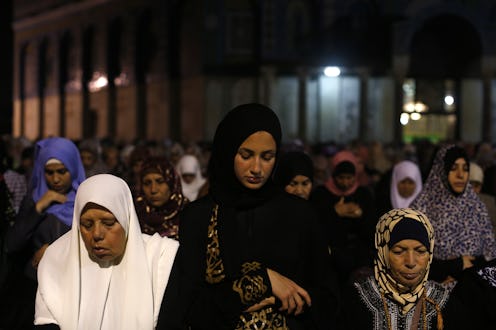News
What It's Like To Be A Woman In Iraq
Iraq has been a war zone for more than a decade, first with the invasion of U.S. troops in 2003 and now with the growing threat of ISIS. While the violence affects everyone in the country, Iraqi women face much different struggles than the men, including a widespread and systematic culture of rape and sex slavery within ISIS. Iraq's Constitution, adopted in 2005, states that all citizens are equal and prohibits discrimination based on gender, but there are still wide gender gaps in many aspects of life due to religious rules, as well as fear of attacks. So, what's it like to be a woman in Iraq today?
A 17-year-old Iraqi girl named Noor described the degradation women and girls face in an op-ed on The Daily Beast, saying: "I was made to believe that being a girl was such a disgrace and I was something really awful." Although Iraq, like most countries, was never gender equal, some aspects of life have gotten worse for women in the last two decades because of the violence and ISIS's rising religious influence. Iraqi citizen Iqbal al-Juboori told NPR that she wants Americans to know that Iraq is still suffering. She said: "I would like the Americans to take the heart and remember that there are a lot of people in need, still, in the country. They don't have a voice, but they are still in conflict. They are still suffering and there is still a lot to be done."
Here are what some aspects of life are like for Iraqi women today.
Dress & Other Restrictions
Women in ISIS-controlled territory must follow strict religious rules about how to dress, including that they need to wear double-layered veils, loose abayas, and gloves, according to The Guardian. Maha Saleh, a 36-year-old resident of Mosul in northern Iraq, told The Guardian: "They forced women of all ages to wear a veil, even though the majority of the women in Mosul wear a hijab." Before ISIS, many women typically wore a hijab, which covers the head and chest, but leaves the face exposed, but it wasn't required.
Iraqi women are unable to get a passport and leave the country without permission from a male relative, according to the OECD Development Centre. It's even difficult for them to leave the house without a male escort, as a guide to life under the Islamic State written by female jihadis, titled "Women of the Islamic State: Manifesto and Case Study," says that women should stay behind closed doors and only leave the house for exceptional circumstances. Restrictions on women leaving the house were not always so strict, as many more women worked outside the home in the 1990s.
Sex Trafficking
As ISIS' power increases, more and more Iraqi women are being sold into sex slavery, according to The New York Times. The militant group largely targets the religious minority the Yazidis, because of its ties to Christianity, but the Islamic State has also said it's permissible to rape Christian and Jewish women captured in battle, according to the Times. Minority Rights Group International estimated earlier in the year that as many as 10,000 women and girls had been abducted and trafficked into sex slavery in Iraq.
"Human trafficking operations are not carried out randomly, but in a very organized manner by gangs that are involved in these operations at all levels — including begging, prostitution, and organ trafficking," Ramziya Zana, who works to fight human trafficking in the Kurdistan region of Iraq, told Al-Monitor. The Iraqi government passed an anti-sex trafficking law in 2012, and began several investigations in 2013, but did not prosecute anyone, according to Minority Rights Group International.
Marriage
The average Iraqi woman gets married at the age of 23. According to Iraq's Ministry of Planning, 22 percent of Iraqi girls were married before the age of 18 in 2012 despite the legal marriage age being 18. In 2014, legislators proposed lowering the legal marriage age to nine, and though the law didn't pass, it highlighted the growing influence of Shi'ite Islamist ideals in the country, according to Reuters. Divorce rates in Iraq are on the rise and increased 40 percent in 2012 from previous years. According to Al-Monitor, divorces leave women as "social rejects" due to negative perceptions of unmarried women.
Work & Education
A huge gender gap still persists when it comes to working in Iraq — while 72 percent of Iraqi men are in the labor force, only 13 percent of women participate, according to the United Nations Development Program in Iraq. After the Iran-Iraq war in the 1980s, women worked much more to help meet the country's economic demand, and made up 21 percent of the workforce in 1993, according to a 2005 Congressional Research Service (CRS) report. Under Saddam Hussein's leadership, women were encouraged to fill the traditional role of homemaker, and female employment dropped. A lack of security and attacks on female professionals by ISIS has discouraged women from working outside the home even more, according to UNICEF. "Discrimination against women today is unprecedented," Sarah Muthulak, a spokeswoman for the Baghdad-based Women’s Rights Association, told IRIN News about women being fired from their jobs. "They are being sacked because of their gender; that is unacceptable."
The disparity is much smaller for education, though girls are still educated at lower rates than boys: 82 percent of Iraqi girls go to primary school, compared to 93 percent of boys. However, according to the CRS report, the overall primary school attendance for Iraqi children was 93 percent at the beginning of the 1990s, so girls' attendance has dropped a bit.
